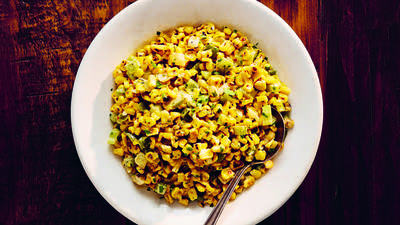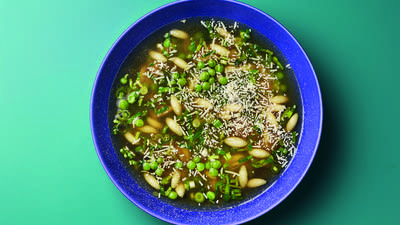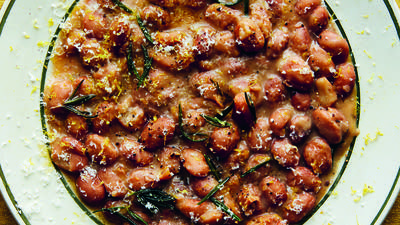
Chef Bill Kim made his name as a fine dining chef; he ran the kitchen at the legendary Charlie Trotter’s in Chicago, which had one of the first tasting menus in the United States. But since he left that world he’s dug into two things: the Asian flavors he grew up with and boiling his cooking down to simple sauces that pack tons of flavor. This led to his new book, Korean BBQ, which is filled with delicious recipes you can make at home with the help of a few innovative sauces. Francis Lam talked with Kim about three of his favorite sauces and how to use them at home. Enjoy experimenting with his recipes for Korean BBQ Sauce, Curry Salt and Korican Sauce.
FL: Your book presents a collection of recipes that revolve around fewer than a dozen sauces, salt blends and paste. What is purpose of consolidating flavors into this tidy list of condiments?
BK: When people cook Asian food, you buy a bunch of ingredients and you cook Asian once. Then a few days later you still have the same ingredients. The idea was to let Asian cooking be a part of your daily routine. Take these master sauces and add them to enhance something else that you already do in your cooking.
 Bill Kim
Photo: Johnny Autry
Bill Kim
Photo: Johnny Autry
FL: A lot of cookbooks start with information on the pantry you should try to build before you start cooking the recipes. And then six days into cooking, you have all of these condiments that you might you twice in your life. I love that you boil it down to ten items and then, literally, every recipe uses those things. It’s like, this is really your pantry. This is the palatte you can draw from.
What I’d like to do with you – since we are in the heart of grilling season – I think it would be fun to walk through a few of these sauces and seasonings, and you can help us think about how to use it. The first one I’d like to talk to you about is the Korean BBQ Sauce. It’s sort of funny because there is Korean barbecue, and then there is barbecue sauce, but Korean barbecue doesn’t really have barbecue sauce. So what’s the deal?
BK: It doesn’t. But, you know, it’s the whole idea that when you make the Korean barbecue marinade you’re always going to have a little bit left. You’re like, “What do I do with this stuff?” You might have plain yogurt in your refrigerator. You might have a vegetable spread or something that you can add. That’s just me, coming from my childhood, things that I used to do. I can’t believe I’m telling everybody this. My dad used to have Aqua Velva in the bathroom. I used to lock myself in the bathroom and play a mixologist, but with shaving cream, cologne, mouthwash and toothpaste. And that’s how I got started with all of this, by wondering what I could concoct.
I feel the same kind of way with the Korean barbecue marinade, when you add yogurt these are two tenderizers, and when you add to a chicken, it becomes sweet and sour that goes well together, but it’s melding two different things. If you’re eating Korean barbecue you also eat it with ssamjang, you also add kimchi to it. You can just blend that marinade with other things you’re going to eat.
FL: Your recipe for it is sugar, soy sauce, onion, pear, kiwi, garlic, ginger and sesame oil – all blended together in a blender. And you’re saying to use that as a marinade. Or mix it with yogurt and it becomes own sauce. You can mix it with gochujang, which is a fermented chili paste. There’s all these sorts of Korean mother sauces and flavor enhancers that you can add it to and use as your sauce later. How else would you riff on the Korean BBQ Sauce?
BK: If you’re cooking on a grill, oven or sauté pan, your could actually baste it. Instead of just letting it marinade, it becomes a glaze and a sauce; you’re accenting the flavor right at the end so it glistens on a piece of chicken, salmon or pork. You building the flavors on top of letting it sit in the marinade. It also becomes the sauce as it cooks, reduces and chars. That’s a great way to impart those delicious flavors.
 Clockwise from left: Korean BBQ Sauce, Curry Salt, Korican Sauce.
Photos: Johnny Autry
Clockwise from left: Korean BBQ Sauce, Curry Salt, Korican Sauce.
Photos: Johnny Autry
FL: Let’s go to another one. You have Curry Salt. It’s equal parts curry powder and salt with a little Japanese chili powder. How do you use that?
BK: While putting salt on something is great, I like to add other flavors with the turmeric and cumin in curry powder. You can use it to season fries, chips, even fish and chicken. Why add just salt when you can add other items that have salty elements to it? It imparts that aromatic, earthy characteristic with a little bit of spice from the curry. Because curry powder is soluble in oil, when your grilling add a little bit of oil to food like asparagus to season it; the flavor will penetrate the vegetable very well.
 Korean BBQ by Bill Kim
Korean BBQ by Bill Kim
FL: How about Korican Sauce? It’s got paprika, oregano, chili powder, curry powder, salt, vinegar, olive oil and a mega-ton of garlic. Tell me about this sauce and how to use it.
BK: My wife is Puerto Rican. I’m Korean. We call ourselves Korican. By the way, she does not cook – she admits it. But her mom, Lola, is a great cook; once she met me she wanted to show me her Puerto Rican recipes. This is one of her famous marinades. Lola showed me how to take vinegar and use that as part of a sauce to help tenderize meat and impart flavors. Garlic, oregano, curry powder – to me that was foreign. But as I tasted her food I realized it was sort of like Korean food because you impart haunting flavors.
For the sauce, you put everything in a blender to blend it. It’s an enhancer; you use this as a base to build other things. You're able to start with something super flavorful, then you add or subtract for what you do. You can use it as a marinade for turkey. For Thanksgiving, there’s only four of us, so every year we get three turkey tenderloins, and it’s so delicious. We don’t have to brine and let it sit for 10 hours. We put the turkey in the Korican Sauce marinade, let it sit for four hours, then let it cook. We have amazing turkey in about 45 minutes.
FL: I love that you can use it on its own, but you can also use this Korican Sauce to add to other sauces like nuoc cham, which is the Vietnamese dip – made with fish sauce, lime, sugar, chili, and garlic – that you get with your spring rolls. You can mix it together with that and create a whole new sauce with it. I love the building block style of cooking. You can mix and match. Dunk in chicken, dunk in pork, let it marinade. Sear it, grill and finish off with it. You have a thousand combinations.
Before you go...
Each week, The Splendid Table brings you stories that expand your world view, inspire you to try something new, and show how food connects us all. We rely on your generous support. For as little as $5 a month, you can have a lasting impact on The Splendid Table. And, when you donate, you’ll join a community of like-minded individuals who love good food, good conversation, and kitchen companionship. Show your love for The Splendid Table with a gift today.
Thank you for your support.
Donate today for as little as $5.00 a month. Your gift only takes a few minutes and has a lasting impact on The Splendid Table and you'll be welcomed into The Splendid Table Co-op.




